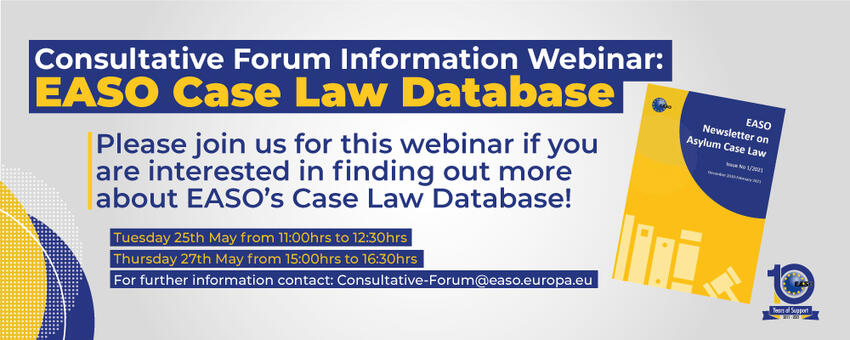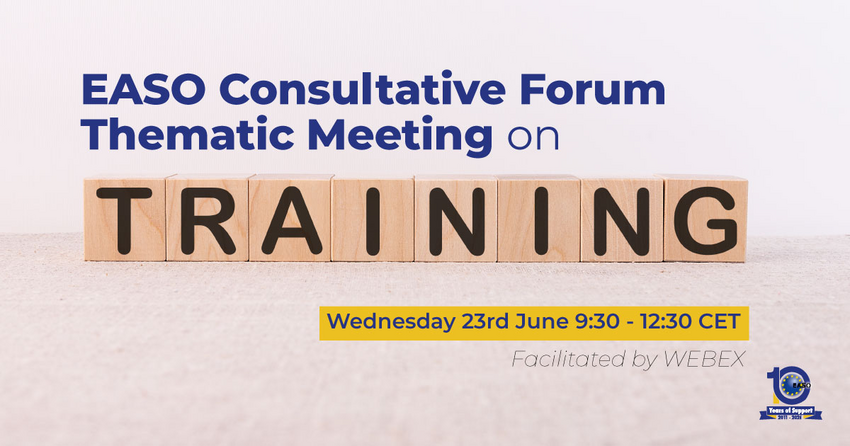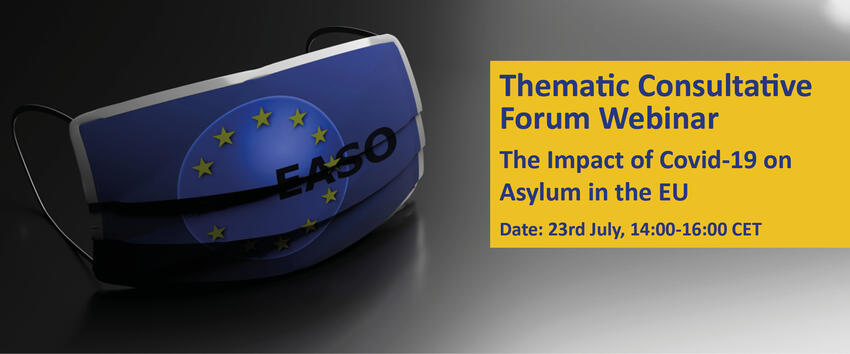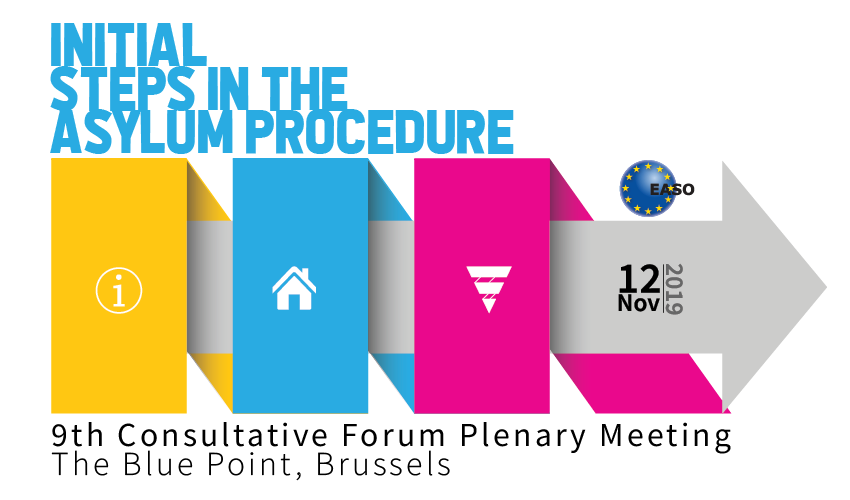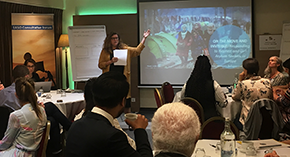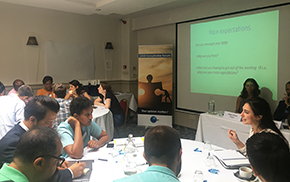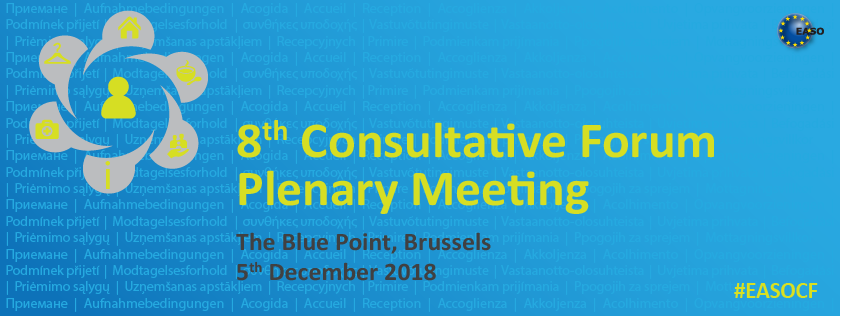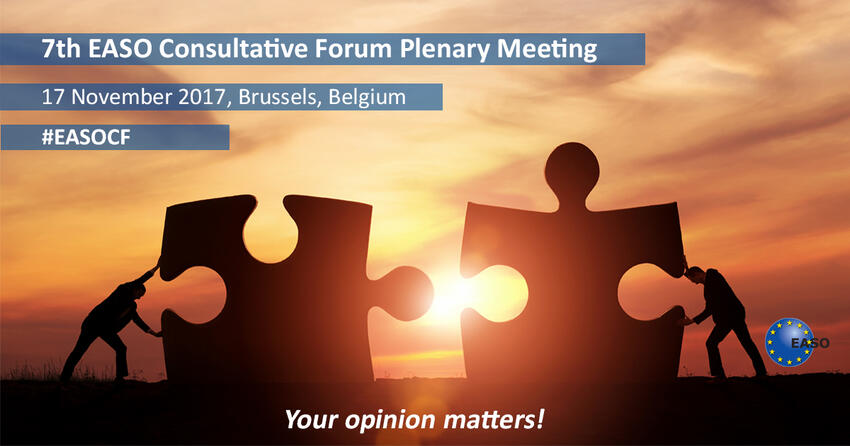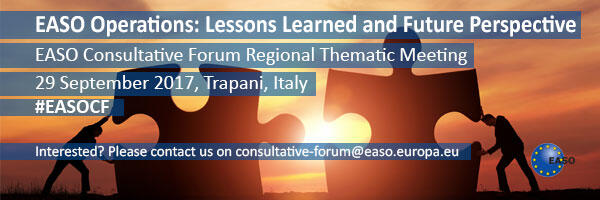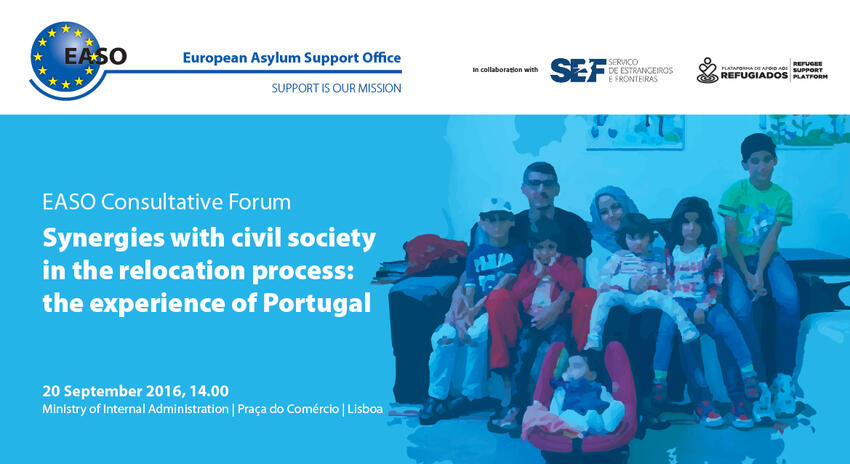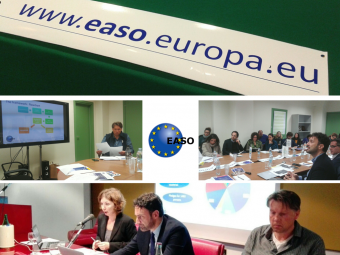Consultative Forum Activities
EUAA Consultative Forum activities in 2023
Following the entry into force of the EUAA Regulation, the Consultative Forum was reconstituted in Q3 of 2022. Although reconstituted, in 2023, the Consultative Forum remains in a transitional phase until the working methods will have been established, which as per the EUAA Regulation need to be established by the Forum itself. As such, the development of the working methods is one of the key priorities in 2023. Another priority will be for the newly established thematic consultation groups (on Country of Origin Information and Vulnerable Groups, respectively) to meet and to kickstart their work. Next to that, the Forum will continue to implement other CF meetings and activities, including for example thematic meetings, information webinars, workshops and various other electronic consultations, all under the guidance of the CF Chair ad interim and assisted by the Consultative Forum Secretariat.
The table below presents a summary overview of the planned activities for the EUAA Consultative Forum in 2023.
| Type of Activity | Date |
|---|---|
| Development CF working methods | By end of Q2 |
| Thematic Consultation groups on COI and VG | Q1 (for first meeting) and Q4 (for possible second meeting) |
| CF thematic meeting and consultations on training | Q1 for thematic meeting Q2-4 for consultations |
| Exchange between CF and FRO | Regular exchange |
| Exchange of views on the monitoring mechanism | Q2 |
| Ad hoc information webinars/workshops | On a needs basis |
| Annual CF Plenary meeting | Q4 |
| Electronic consultations on key Agency documents | Throughout the year |
2022 will mostly be a transitional year for the Consultative Forum. The EUAA Regulation foresees changes to the CF; the Forum will become independent from the Agency and its role will be reinforced to advise the Executive Director and the Management Board on asylum-related matters. The main priority this year will therefore be the establishment and operationalisation of the revised CF under the EUAA.
Until the new Forum with revised governance structure is in place, the Agency will continue to organise and implement various CF meetings and activities, including workshops, information webinars and consultations.
The visual below provides a tentative overview of the planned CF meetings and activities for 2022 in each quarter:
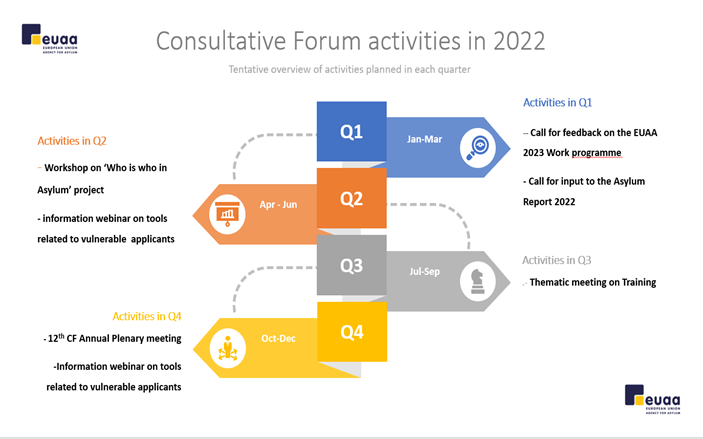
In addition, CF members will of course continue to be consulted on other key Agency documents when relevant.
We invite you to watch this space for more information on upcoming Consultative Forum events.
In 2021, an ambitious programme of activities was implemented for the EASO Consultative Forum:
- Information webinars
- Workshops
- CF thematic meeting
- The annual CF Plenary meeting
Information webinars was a new activity launched in 2021. The main aim of these short sessions was to present recent tools, reports, and products as developed by the Consultative Forum. During May, the Consultative has successfully organised 2 information sessions on the Case-Law database attracting more than 55 participants. More information on this webinar including the recording of one of the sessions can be found below.
In 2021, the thematic meeting focused on training activities and was organised on 23 June. The Training and Professional Development Centre has been working on upgrading and restructuring its training offer, in line with European Sectorial Qualification Framework. As part of these efforts, a more structured consultation process with selected Consultative Forum Members was sought in order to enhance the Agency's training materials with their knowledge and expertise.
Finally, the annual CF Plenary meeting was organised on 16 November in Malta in a hybrid format. A survey was launched prior to the meeting, in order to consult civil society on both the format of the meeting and the topics to be addressed. The plenary meeting focused on the added value of the EUAA for the Common European Asylum System, with breakout sessions focusing on training, vulnerable applicants, and asylum processes.
2020 has been a year of unprecedented challenges. The COVID-19 pandemic dominated European citizen's lives and presented significant challenges to the economy, employment as well as to migration and asylum issues within the EU. With a view of ensuring business continuity, the EUAA Consultative Forum quickly adapted to the new situation and adjusted its activities accordingly. The following activities were organised via online platforms:
-
10th edition of the annual online plenary meeting
The 10th edition of the annual online plenary meeting, held in the mornings of 13 and 14 October of which the overall theme focused on the evolution of the Agency over the last ten years and perspectives for the future. The meeting consisted of both plenary discussions on day 1 as well as interactive thematic parallel break-out sessions on day 2. The event was attended by more than 200 participants in the plenary sessions and more than 100 participants who attended the different workshops.
-
Thematic webinar on the impact of COVID-19 on asylum in the EU
A thematic webinar on the impact of COVID-19 on asylum in the EU was organised on 23rd July. The webinar was actively followed by up to 100 participants including representatives from mostly NGOs as well as IGOs, academia, think tanks, Member States authorities, EU institutions and EUAA staff.
CF members further provided 244 contributions in response to six electronic consultations.
The consultations concerned:
- call for feedback on the 2018 EASO Annual Report on the situation of Asylum;
- call for feedback on the EASO 2021 Work Programme;
- call for input to the 2019 Annual Report on the Situation of Asylum;
- call for feedback on the EASO Annual General Report 2019;
- Survey on the CF Plenary Meeting 2020;
- call for input of relevant publications for the early drafting phase of the AR 2020
Numerous CSOs also directly took part in many different EUAA meetings and activities related to COI meetings and production of COI reports, development of practical tools, development and update of EUAA training modules, material and training sessions, as well as activities in the context of the Vulnerability Expert Network (VEN).
EASO organised the 9th edition of its Consultative Forum Plenary Meeting, entitled “Initial steps in the asylum procedure”, on the 12th of November 2019 in Brussels. See below.
EASO Consultative Forum Thematic Meeting on gender-related persecution
On 11th July, EASO organised a Consultative Forum Thematic Meeting on gender-related persecution. The meeting gathered around 35 specialised civil society organisations (CSOs). The overall aim of the meeting was to: explore how CSOs support persons in the EU+ Member States’ asylum and reception systems who experienced gender-related persecution; identify the main challenges and good practices, and; discuss if and how EASO could integrate civil society’s expertise in possible future work on this topic, see below.
For any questions, please write to: Consultative-Forum@easo.europa.eu.
Highlights of Consultative Forum activities in 2018
- Three Consultative Forum meetings: a thematic meeting on 28th March in Malta concerning the provision of information to applicants for international protection; an informal Consultative Forum Planning Meeting in Brussels on 18th June where participants continued discussions on the provision of information and also contributed their ideas for the Plenary, and the 8th Annual Plenary Meeting on reception which took place on 5th December in Brussels.
- Six electronic consultations with carried out with more than 121 contributions received. The consultations concerned the Annual Report on the Situation of Asylum in 2017, the draft Work Programme 2019, the Annual General Report 2017 as well as the draft EASO judicial analysis on detention of applicants for international protection in the context of the Common European Asylum System. In addition, to inform about its research activities, EASO asked civil society for input on the situation of applicants from Bangladesh in the EU+ via an online survey. Finally an open survey on CSOs’ information activities fed into the CF thematic meeting on access to information as well as the resulting Briefing Paper.
- Briefing Paper on the provision of information including a cross sectional analysis of asylum-related information activities implemented by civil society organisations, focusing in particular on those catering to information needs of applicants for international protection. This Briefing Paper was a concrete output following the thematic meeting and the survey on the provision of information.
- Numerous CSOs directly took part in many different EASO meetings and activities related to EASO operations, COI meetings, development of practical tools, training modules, material and training sessions, as well as activities in the context of the Vulnerability Expert Network (VEN).
The annual EASO Consultative Forum Plenary Meeting was held in Brussels on 17th November 2017. Although EASO regularly consults the Forum members throughout the year, the Plenary Meeting has become an important EASO event, attracting hundreds of participants. The main aim of the Plenary Meeting was to take stock of developments in the field of asylum as well as to review cooperation between EASO and civil society. See below.
Regional Thematic Meeting: "EASO Operations: Lessons Learned and Future Perspective"
 In the context of its Consultative Forum activities, EASO organised a Regional Thematic Meeting in Trapani, Italy on 29 September 2017. The meeting, which was dedicated to EASO Operations and future perspectives brought together representatives of EASO, the EU Institutions, members of the Consultative Forum and local NGOs operating on the ground in order to provide information on EASO's operational activities, review the implementation of relocation and the hotspot approach in Italy, identify what has worked well and what can be improved, discuss the future development of EASO support activities in Italy. See below.
In the context of its Consultative Forum activities, EASO organised a Regional Thematic Meeting in Trapani, Italy on 29 September 2017. The meeting, which was dedicated to EASO Operations and future perspectives brought together representatives of EASO, the EU Institutions, members of the Consultative Forum and local NGOs operating on the ground in order to provide information on EASO's operational activities, review the implementation of relocation and the hotspot approach in Italy, identify what has worked well and what can be improved, discuss the future development of EASO support activities in Italy. See below.
6th EASO Consultative Forum Plenary Meeting, Athens 28-29 November 2016
On 28-29 November 2016, the EASO Consultative Forum held its 6th plenary meeting in Athens, attracting over 200 members from civil society organisations.
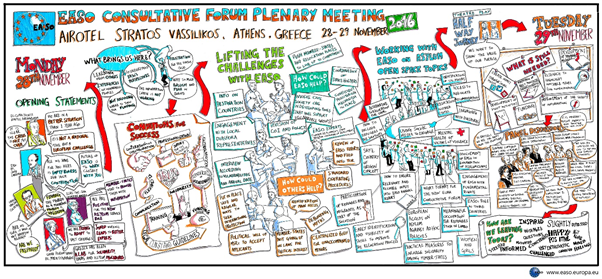
EASO attaches great importance to maintaining a close dialogue with civil society. Many different organisations operate in the field of asylum and their respective expertise, experience and insight is of much added-value to the Agency’s work. The Consultative Forum was set up as a mechanism to enhance the exchange and sharing of knowledge between EASO and relevant stakeholders from civil society. Although various different consultations take place throughout the year, the plenary meeting remains its most important event, as evidenced by the record number of over 200 participants who attended the 6th edition.
The 6th plenary meeting focused in particular on ideas and experiences related to EASO’s work on relocation and the hotspots. As such, the plenary meeting was, for the first time, held in Athens in order to facilitate participation of practitioners operating in the field of asylum and reception in Greece. New in this edition was also the adoption of a fully participatory format, which stimulated participants’ proactive engagement and resulted in real authentic dialogue.
As to the structure, a high-level panel opened the event, outlining the developments and changes that had taken place in the European asylum framework in 2016. Three thematic workshops and an open agenda session followed where participants could present and discuss topics they prioritised. Main discussions included relocation, the hotspot approach, EASO’s activities related to communication, information and analysis, needs of vulnerable groups (including gender issues), integration, the external dimension and fundamental rights. As side events, a marketplace area was made available where organisations could display their material. Furthermore, a play created by fifteen Afghan women refugees was screened followed by a debate with two refugee women who participated in the play. A professional graphic recording visualised the key outputs from the event as illustrated in the picture above.
See 6th EASO Consultative Forum Plenary Report [EN]
See Press Release [EN]
Meeting Documents: Draft Agenda [EN] Consultative Forum Info Note [EN] Venue Info [EN] Background documents [EN] Programme Brochure [EN]
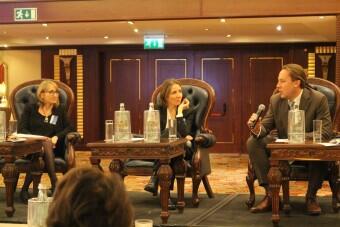
On 30 November EASO held its annual Consultative Forum Meeting, bringing together organizations, academics and experts to discuss the Common European Asylum system and EASO work and activities, in particular those activities related to EASO’s work in the hotspots in Italy and Greece.
EASO attaches great importance to consulting and exchanging views with civil society. In this perspective, this year’s Forum represented a great opportunity for EASO to carry out a fruitful dialogue with key organizations and other interested stakeholders, united in the common effort of improving the way we deal with the reality on the ground. As a European centre of expertise, consultation for EASO is not just an annual meeting but a very effective way to share knowledge and expertise on the many aspects of asylum. Over the past five years, this consultative process provided EASO with additional insight and information which have proven vital to develop more advanced cooperation tools aimed at supporting the implementation the Common European Asylum System.
See Press Release [EN]
See 2015 Consultative Forum Report [EN]
11 December 2014
In his opening remarks, Mark Camilleri, EASO Policy and Interinstitutional Relations Coordinator stated that following several requests by representatives of civil society, EASO decided to hold the meeting in Brussels this year. Even though the two way dialogue with the civil society is a constant process promoted by EASO alongside its activities during the whole year, the aim of a plenary session is to bring together the EASO Consultative Forum members to look at the experience of the past year of working together, identify lessons learned and earmark areas of future cooperation. He added that over 100 participants registered for this year's meeting representing around 60 different organisations. Besides the usual focused discussions on the involvement of civil society in the different areas of EASO’s work, this year’s meeting included a full day thematic conference with over 20 speakers focusing on contingency planning, Member State responses to the flow of Eritrean asylum seekers, different protection statuses granted to Syrian applicants and the use of Article 15 of the Qualification Directive (on qualification for subsidiary protection).
Presentation of latest asylum trends and responses
Timothy Cooper, Head of the EASO Centre for Information, Documentation and Analysis (CIDA), provided information on the latest trends of applicants for international protection, including figures on the top countries of origin, the distribution of applicants among the EU+ countries, the recognition rates and relevant statistics on unaccompanied minors and pending cases.
-
Round table 1: Early warning and preparedness in view of the Ukraine and other crises – Planning and cooperation to strengthen EU and MS responses
Click here for concept paper, lead off presentation and report.
The discussion was moderated by Mr. Laurent Muschel, Director Asylum and Migration, DG Home. Speakers were Ms Elizabeth Collett, Director of MPI Europe, Mr. Tomasz Dzięcioł, Chief Specialist, Office for Foreigners, Poland and Mr. Christer Zettergren, Swedish Migration Board. A lead off presentation was delivered by Mr. David Dowey, EASO Senior Data and Analysis Coordinator.
The panel focused on how early warning systems have helped Member States to be better prepared for influxes of persons seeking international protection and how EU and MS-level planning and cooperation has helped strengthen Member States response to such situations.
-
Round table 2: Influx of Eritrean asylum seekers: EU and MS practical responses
Click here for concept paper, lead off presentation and report.
The discussion was moderated by Francesco Maiani, Associate Professor, IDHEAP. Speakers were Ms. Eva Singer, Danish Refugee Council, Mr. Mohammed Fitwi, Norwegian Organisation for Asylum Seekers, and Mr. Paulus Bouma, Immigration and Naturalisation Service, The Netherlands. A lead off presentation was delivered by Mr. Ward Lutin, EASO Documentation and COI Officer. The panel explored how the EU and Member States have responded to the influx of Eritrean asylum seekers from an operational point of view, in particular the destination States. EASO presented an overview on applicants and protection rates in the EU + and the outcomes of its recent practical cooperation meeting on Eritrea.
-
Round table 3: Different forms of protection granted in the EU to Syrian applicants: analysis of similarities and differences in MS application of legal concepts
Click here for concept paper, lead off presentation and report.
The discussion was moderated by Doris Peschke, Churches' Commission for Migrants in Europe. Speakers were Ms. Nele Allenberg, Evangelical Church in Germany, Mr. Michael Williams, FARR Swedish Network of Refugee Support Groups, Ms. Blanche Tax, UNHCR Geneva and Ursula Countess Praschma, Bundesamt für Migration und Flüchtlinge, Germany. A lead off presentation was delivered by Ms. Jadwiga Maczynska, EASO Information and Analysis Coordinator.
The panel analysed the similarities and differences in the type of protection granted to Syrian applicants and the application of the relevant EU legal concepts in such cases. In September 2014, Syrians were by far the largest group and during this period almost one out of four applicants in the EU + was Syrian. 20 EU + States had Syria as one of the top three countries of origin. While the majority of the EU + States issue a high protection rate to Syrian applicants, some States stand out with significantly lower rates. Moreover, where granted, the type of protection differs substantially. While some EU + States grant refugee status, other grant subsidiary protection or even humanitarian protection.
-
Round table 4: Facilitating a more common use of Article 15 QD in the EU – EASO’s COI and practical cooperation activities on Afghanistan and the development of guidance and tools on Art 15c
Click here for concept paper, lead off presentation and report.
The discussion was moderated by Judge Bernard Dawson, Upper Tribunal, Immigration and Asylum Chamber, UK. Speakers were Achilles Skordas, Professor at University of Bristol, UK and Laurent Aldenhoff, European Council on Refugees and Exiles. A lead off presentation was delivered by Mr. Jamil Addou, EASO Training, Quality and Expertise Officer.
The panel discussed Member State’s existing practices in applying Article 15 of the Qualification Directive (with a particular emphasis on the notion of ’serious harm’) with regard to specific groups of applicants for international protection. Challenges in establishing country of origin information and in practical interpretation of legal notions regarding different forms of international protection were examined. The panel furthermore explored practical measures to stimulate convergence and harmonisation of practices, through efforts such as EASO’s COI and practical cooperation activities, on Afghanistan and other relevant countries of origin and guidance and tools on Article 15C.
12 December 2014
Key note speech by a Member of the European Parliament's Civil Liberties, Justice and Home Affairs Committee (LIBE) – MEP Laura Ferrara
MEP Ferrara highlighted how the role played by civil society is instrumental and complementary to the work of EASO. Civil society organizations represent an essential tool to complete the information received from Member States authorities and to capture in due time any alerts of malfunctioning of system or exemplary good practices. Therefore, the timely dialogue between EASO and civil society was recognized of outmost importance. The coherent implementation of the CEAS will enable to improve the EU system globally, but it requires reaching common standards in different Member States and building trust. This goal can only be reached through a multi-actor framework, where civil society, state authorities and EASO work together. References were made to the important tasks of EASO to provide statistical data to the co-legislators, to support the implementation of art.33 of the Dublin Regulation in regards to early warning and preparedness and to develop further ways to support Member States under particular pressure.
Key note speech by Dr Robert K. Visser, EASO Executive Director
The EASO Executive Director provided a thorough analysis of the achievements and of the way forward for EASO’s cooperation with civil society. Some remarkable results were highlighted, including the around 100 contributions received in 2014 by over 70 organizations, the establishment of three focused consultation channels, the input of civil society to the 2013 EASO Annual Report on the Situation of Asylum in the EU and its public launch in Brussels, and the different channels developed by EASO in order to promote a wider dissemination of information (i.e. newsletter, improved interactive webpage, participation of civil society representatives to meeting and workshops). The EASO Executive Director presented the main actions foreseen for 2015 to strengthen EASO’s engagement with civil society: involve civil society and academia to further develop common COI and grant public access to the COI Portal; engage civil society in EASO’s work as ‘clearing house’ on resettlement; organize focused meetings with national and local NGOs in the countries where EASO is offering operational support; visit a number of consultative forum members on the job; explore additional ways for civil society to provide inputs to EASO Early warning and Preparedness System (EPS) and the EASO Information and Documentation System.
-
Break out session 1 – Producing and sharing EU-level COI
Click here for concept paper and report.
The session was facilitated by Stephanie Huber Asylum Research Consultancy and Ward Lutin EASO Documentation and COI Officer. Following the recent EASO COI Publications on Somalia and Chechnya, and in light of the ongoing production of a COI report on the security situation in Afghanistan and a Guide on COI and LGBTI, this session aimed to provide some insight into the EASO COI production processes and inform civil society about some new developments with regard to sharing and producing EU-level COI. It also aimed at identifying and discussing possible input from different stakeholders on the production of COI by EASO. During the discussion, participants exchanged views on the role and added value of COI reports. Diverging opinions were voiced on whether COI reports should contain analysis and whether or not they should be policy-oriented. The need for balanced sources was stressed. At the end of the session, EASO briefly referred to the recently adopted proposal to make the European COI Portal publicly available.
-
Break out session 2 – EASO's operational support
Click here for concept paper and report.
The session was facilitated by Eva Singer Danish Refugee Council and Anca Pristavu EASO Operational Support Officer. Participants exchanged views on tools used in emergency and tailor made support provided by EASO to requesting Member States and the impact that these had on the asylum and reception systems of those Member States. The possible contribution of civil society in this context was discussed. It was agreed that a cooperation platform be set up and a methodology drafted in order for civil society representatives to be part of an EASO operational support area.
-
Session 3 – EASO's quality processes
Click here for concept paper, presentation and report.
The session was facilitated by Wilfried Buchhorn Head of UNHCR Liaison Office to EASO and Jamil Addou EASO Training, Quality and Expertise Officer. Participants were introduced to the EASO quality processes, the method used, outcomes and tools developed. The discussion focussed on the progress made so far and on possible ways in which civil society could contribute to the Quality Matrix process. EASO underscored that the Quality tools are meant to contribute to better efficiency in the daily work of case officers. In order to foster the involvement of civil society in the development of Quality Tools, EASO was invited to publicise its plans. It was also noted that civil society has a role to play at the national level to cooperate with national authorities in providing external feedback on the implementation of quality standards.
-
Session 4 – EASO’s Information and Documentation System
Click here for concept paper and report.
The session was facilitated by Kris Pollet, ECRE and Jadwiga Maczynska EASO Information and Analysis Coordinator. Ms. Maczynska outlined the development of EASO’s Information and Documentation System (IDS) as a key tool in understanding how the Common European Asylum System (CEAS) functions. EASO demonstrated how IDS could be used to source key information on asylum processes across EU+ countries, while Kris Pollet provided an interesting overview on ECRE’s Asylum Information Database (AIDA) project.
Key points included the challenge of keeping IDS accurate and up to date, making it a tool that adds value rather than replicates information stored elsewhere, and ensuring it becomes an important reference point at EU+ level.
Consultations
Input from Civil Society to the Asylum Report 2024
- Aditus Foundation
- Arca di Noè Società Cooperativa Sociale
- Association for Juridical Studies on Immigration - ASGI
- Association for legal intervention | Stowarzyszenie Interwencji Prawnej
- AsyLex
- Asylos
- Asylrättscentrum | Swedish Refugee Law Center
- Asylum Protection Center
- Border Violence Monitoring Network - BVMN
- Centre of Migration Research, University of Warsaw and SGH Warsaw School of Economics
- Comisión Española de Ayuda al Refugiado (CEAR) | Spanish Commission for Refugees
- Convive -Fundación Cepaim
- Council on Refugee Women in Bulgaria
- Danish Refugee Council -DRC
- DRC Greece
- Dutch Advisory Council on Migration
- Equal Legal Aid
- Estonian Refugee Council
- European Council on Refugees and Exiles - ECRE
- European Council on Refugees and Exiles -ECRE (publications)
- European Network of Migrant Women
- European Network on Statelessness
- Forum Réfugiés
- Greek Council for Refugees
- Helsinki Foundation for Human Rights
- Hungarian Helsinki Committee
- International Rescue Committee (IRC) Hellas
- International Rescue Committee (IRC) Italy
- Irish Refugee Council
- Jesuit Refugee Service (JRS) Malta
- Lithuanian Red Cross Society
- Macedonian Young Lawyers Association
- Migrant Integration Center - Brasov
- Migrant Offshore Aid Station - MOAS
- Missing Children Europe
- Nansen, The Belgian Refugee Council
- Network for Children’s Rights
- Organisation for Aid to Refugees - OPU
- Romanian National Council for Refugees
- Santa Casa da Misericórdia de Lisboa
- Stichting Nidos
Overview of planned consultations with civil society in 2023
| Consultation on: | Deadline | Status |
|---|---|---|
| Call for Civil Society Input to the Asylum Report 2023 | 3 February 2023 | Closed |
| Consultation on the Training Module Access to the asylum procedure | 1 March 2023 | Closed |
| Consultation on the Training module on Psychosocial support and guidance in reception | 14 April 2023 | Closed |
| Consultation on the Training module on Lodging an application for international protection | 14 April 2023 | Closed |
| Consultation on the Training module on inclusion advanced | 14 July 2023 | Closed |
| Call for civil society input to the Asylum Report 2024 | 30 November 2023 | Closed |
Input from Civil Society to the Asylum Report 2023
- Accem
- Arca di Noè Società Cooperativa Sociale
- Association for Legal Intervention (Stowarzyszenie Interwencji Prawnej)
- AsyLex
- Asylos
- Border Violence Monitoring Network (BVMN)
- Centro Astalli - ODV
- Comisión Española de Ayuda al Refugiado -CEAR (Spanish Commission for Refugees)
- Convive - Fundación Cepaim
- Danish Refugee Council - DRC
- Deutscher Anwaltverein - DAV
- DRC Greece
- European Council on Refugees and Exiles (ECRE)
- Forum Réfugiés Cosi
- Greek Council for Refugees
- Helsinki Foundation for Human Rights
- Hungarian Helsinki Committee
- I Have Rights
- Jesuit Refugee Service Luxembourg
- Jesuit Refugee Service Serbia
- Joint submission by Volontariato Internazionale per lo Sviluppo (VIS), Comitato per la promozione e protezione dei diritti umani, Associazione Don Bosco 2000, Salesiani per il Sociale, Forum per cambiare l’ordine delle cose
- L'Auberge des Migrants - Human Rights Observers
- Lithuanian Red Cross society
- Ludwig Boltzmann Institute of Fundamental and Human Rights
- Migrant Integration Center - Brasov
- Migrant Offshore Aid Station - MOAS
- Multiculturalism and Migration Observatory - Cracow University of Economics
- Network for Children’s Rights
- Norwegian Organisation for Asylum Seekers (NOAS)
- Organisation for Aid to Refugees - OPU
- Organisation Intersex International Europe - OII Europe
- Österreichischer Rechtsanwaltskammertag - ÖRAK
- Progestion
- Servicio Jesuita a Migrantes - España (SJM)
- Slovak Humanitarian Council
- Stichting Gave
- Stichting Nidos
- Swiss Refugee Council (SFH/OSAR)
- The Rule of Law Institute
Overview of planned consultations with civil society in 2022:
| Consultation Description | Deadline | Target Audience | Status | Form/Related documents |
| Call for input to the Asylum Report 2022 | 21 February 2022 | Members of the CF |
Closed |
|
| Call for feedback on the preliminary EUAA 2023 Work Programme | 31 January 2022 | Members of the CF | Closed |
Please provide your contributions on the planned activities as outlined for 2023 directly to Corporate Planning, Monitoring and Reporting Sector by 31 January 2022. |
Input from Civil Society to the Asylum Report 2022
- Abogacía Española
- AsyLex
- Asylum Research Centre (ARC) Foundation
- Border Violence Monitoring Network (BVMN)
- Centre for Migration Law, Radboud University, Nijmegen, The Netherlands
- Child Circle asbl
- Conseil National des Barreaux
- Convive - Fundación Cepaim
- Danish Refugee Council
- DRC Greece
- Dutch Advisory Committee on Migration Affairs_Dutch Advisory Council Migration
- European Council on Refugees and Exiles (ECRE)
- European Network of National Human Rights Institutions (ENNHRIs)
- European Network on Statelessness
- Forum réfugiés-Cosi
- Friedrich Ebert Foundation/ Global Public Policy Institute
- Helsinki Foundation for Human Rights
- Human Rights League
- HumanRights360
- Hungarian Helsinki Committee
- International Organization for Migration (IOM)
- INTERSOS
- Jesuit Refugee Service (JRS) Europe
- Lithuanian Bar Association
- METAdrasi
- Migrant Integration Center, Brasov
- Migrant Offshore Aid Station (MOAS)
- Migration Policy Institute Europe
- Mobile Info Team
- NANSEN, the Belgian Refugee Council
- Network for Children's Rights
- Organization for Aid to Refugees
- Protestant Church in Germany (EKD), Brussels Office
- Spanish Commission for Refugees -CEAR
- Swiss Refugee Council
- University of Nicosia – miHUB
- VIS inputs in joint submission with Comitato per la promozione e protezione dei diritti umani, Don Bosco 2000, Salesiani per il Sociale
Overview of planned consultations with civil society in 2021
| Consultation on: | Deadline | Status |
|---|---|---|
| Thursday 25 February | Closed | |
|
Consultation on the Staff Welfare Guide |
N/A | Closed |
|
Call for feedback on the EUAA 2022 Work Programme |
Monday 15 March | Closed |
|
Call for feedback on the General Report 2020 |
Thursday 22 July | Closed |
| Evaluation survey of the 2021 Asylum Report | N/A | Q4 |
| Call for input from Civil Society on survey for the 2021 Annual Plenary Meeting | Thursday 10 June | Closed |
Input from Civil Society to the EASO Asylum Report 2021
- Abogacía Española – CGAE (Spain)
- Accem (Spain)
- Andalucia Acoge (Spain)
- Are You Syrious (Croatia)
- Associazione My Lawyer (Italy)
- Asylex (Switzerland)
- Asylum Protection Center (Serbia)
- Asylum Research Centre-ARC Foundation (United Kingdom)
- Border Violence Monitoring Network (BVMN) (International - Balkans)
- Centro Astalli per l'assistenza agli immigrati ODV (Italy)
- Conseil National des Barreaux (France)
- Danish Refugee Council (Denmark)
- DRC Greece (Greece)
- Dutch Advisory Committee on Migration Affairs (Netherlands)
- European Council on Refugees and Exiles (ECRE) (Belgium)
- European Network on Statelessness (International)
- European Trade Union Committee for Education (ETUCE)
- Forum réfugiés-Cosi (France)
- Friedrich Ebert Stiftung - Brussels Office
- Fundación Cepaim (Spain)
- Greek Council for Refugees (Greece)
- Háttér Society (Hungary)
- Helsinki Foundation for Human Rights (Poland)
- Human Rights League (Slovakia)
- HumanRights360 (Greece)
- Hungarian Helsinki Committee (Hungary)
- Malta Refugee Council (Malta)
- METAdrasi (Greece)
- Migrant Integration Center - Brasov (Romania)
- Migration Policy Institute Europe (Belgium)
- Mobile Info Team (Greece)
- Network for Children’s Rights (Greece)
- Norwegian Organisation for Asylum Seekers (NOAS) (Norway)
- Organization for Aid to Refugees (OPU) and Forum for Human Rights (joint contribution; Czechia)
- Rädda Barnen-Save the Children (Sweden)
- Refugee Rights Europe (United Kingdom)
- Refugee Support Aegean (Greece)
- Spanish Commission for Refugees - CEAR (Spain)
- Statewatch (International)
- The Swedish Network of Refugee Support Groups (FARR) (Sweden)
- Transgender Europe (TGEU) (Germany)
- University of Nicosia, MiHUB (Cyprus)
- Volontariato Internazionale per lo Sviluppo (VIS); Comitato per la promozione e protezione dei dirittiumani; Don Bosco 2000; Salesiani per il Sociale; and Forum per Cambiare l’Ordine delle Cose (joint submission; Italy)
Overview of planned consultations with civil society in 2020
| Consultation Description | Deadline | Target Audience | Status |
|
Call for feedback on the EASO Annual Report on the Situation of Asylum in the EU in 2018 |
Friday 7 February | Civil society organisations | Closed |
|
Call for feedback on the EASO 2021 Work Programme |
Thursday 30 April | Civil society organisations | Closed |
| Call for input to the 2019 EASO Annual Report on the Situation of Asylum in the EU | Tuesday 10 March | Civil society organisations | See input |
| Call for feedback on the EASO Annual General Report 2019 | Friday 24 July | Civil society organisations | Closed |
| Call for input of relevant publications for the early drafting phase of the Annual Report 2020 | Friday 11 December | Civil society organisations | Closed |
Input from civil society to the 2019 EASO Annual Report on the Situation of Asylum in the EU
- Are you Syrious (Croatia)
- Associazione My Lawyer (Italy)
- AsyLex (Switzerland)
- Asylum Protection Center (Serbia)
- Asylum Research Centre Foundation (United Kingdom)
- Caritas Austria
- Caritas Wien Rechtsberatung (Austria)
- Cyprus Council for Refugees
- Danish Refugee Council Greece
- Dutch Advisory Committee on Migration Affairs (the Netherlands)
- European Council on Refugees and Exiles - ECRE (Belgium)
- Forum réfugiés-Cosi (France)
- Fundación Cepaim (Spain)
- Helsinki Foundation for Human Rights (Poland)
- HumanRights360 (Greece)
- Hungarian Helsinki Commitee (Hungary)
- Ludwig Boltzmann Institute of Human Rights (Austria)
- Migrant Integration Center Brasov (Romania)
- Missing Children Europe (Belgium)
- Network for Children's Rights (Greece)
- Safe Passage International (United Kingdom)
- Sexual Orientation and Gender Identity Claims of Asylum (SOGICA) Project, University of Sussex (United Kingdom)
- Spanish Commission for Refugees - CEAR (Spain)
- Stichting Nidos (the Netherlands)
- VIS - Volontariato Internazionale per lo Sviluppo (Italy)
Should you require any further information with regards to a particular consultation, please contact us by email.
Overview of consultations with civil society in 2019
| Consultation Description | Deadline | Target Audience | Status |
|
Call for civil society input to the 2018 EASO Annual Report on the Situation of Asylum in the EU Background: The Annual Report on the Situation of Asylum in the EU is one EASO's flagship products. It includes a comprehensive analysis of relevant statistics, as well as information on important asylum related developments at EU+ and national level and on the practical functioning of the CEAS. |
Thursday 7 March | Consultative Forum Members | See Input |
|
Call for input from civil society for the 2019 Consultative Forum Meetings Background: This Survey seeks input on what theme the Consultative Forum meetings should focus on and asks for ideas and suggestions as to how you would like to see the meetings implememented. |
Friday 15 February | Consultative Forum Members | Closed |
| Call for civil society feedback on the EASO 2020 Work Programme | Wednesday 20 February | Consultative Forum Members | Closed |
| Annual General Report 2018 | Consultative Forum Members | Closed | |
| Consultation Request on the Judiciary Analysis on Legal Standards for the Reception of Applicants for International Protection | Friday 20 September | Consultative Forum Members | Closed |
Input from civil society to the 2018 EASO Annual Report on the Situation of Asylum in the EU
- AsyLex, (Switzerland)
- Asylum Protection Center (Czech Republic)
- Asylum Research Centre
- Center for the Public Innovation (Romania)
- Danish Refugee Council (Greece)
- Dutch Advisory Committee on Migration Affairs (the Netherlands)
- Dutch Council for Refugees (the Netherlands) [Contribution not disclosed]
- European Council on Refugees and Exiles, ECRE, (Belgium)
- European Network on Statelesness (United Kingdom)
- Forum réfugiés-Cosi (France) [Contribution not disclosed]
- Fundación Cepaim (Spain)
- Helsinki Foundation for Human Rights, (Poland)
- Human Rights 360 (Greece)
- Hungarian Helsinki Commitee (Hungary)
- Ludwig Boltzmann Institute of Human Rights (Austria)
- METAdrasi – Action for Migration and Development (Greece) [Contribution not disclosed]
- Migrant Integration Center-Brasov (Romania)
- NANSEN (Belgium)
- Network for Children Rights (Greece)
- Ombudsman of Spain
- Refugee Rights (United Kingdom)
- Safe passage International (France)
- Save the Children (Spain)
- Save the Children (Sweden)
- Solidarity Now (Greece) [Contribution not disclosed]
- Spanish Comission on Refugee Aid (Spain)
- VIS Volontariato Internazionale per lo Sviluppo (Italy)
Input from civil society on the Situation of Asylum in the EU
- Accem, (Spain)
- AsyLex, (Switzerland)
- Asylum Protection Centre, (Serbia)
- Asylum Research Consultancy, (United Kingdom)
- COC Netherlands, (the Netherlands)
- Consejo General de la Abogacía Española, (Spain)
- Danish Refugee Council, (Denmark)
- Dutch Council for Refugees, (the Netherlands)
- Emergency ONG Onlus, (Italy)
- End FGM European Network, (Belgium)
- European Association for the Defence of Human Rights, AEDH, (Belgium)
- European Council on Refugees and Exiles, ECRE, (Belgium)
- Every Child Protected Against Trafficking, ECPAT, (United Kingdom)
- Forum Réfugiés-Cosi, (France)
- Helsinki Foundation for Human Rights, (Poland)
- Hope for Children CRC Policy Center, (Cyprus)
- Hungarian Helsinki Committee, (Hungary)
- International Organisation for Migration, IOM in Bulgaria, (Bulgaria)
- Migrant Integration Centre Brasov, (Romania)
- Network for Children’s Rights, (Greece)
- Norwegian Organisation for Asylum Seekers, NOAS, (Norway)
- Queer Base, (Austria) - [Contribution not disclosed ]
- Refugee Rights Europe, (United Kingdom)
- Safe Passage, (United Kingdom)
- Sant’ Anna School of Advanced Studies Pisa, PHD candidate Alessio Pascali, (Italy)
- Save the Children, (Belgium Office)
- Stichting Unity in Diversity, (the Netherlands)
- The Swedish Network of Refugee Support Groups, (Sweden)
Overview of completed consultations 2017
| Call for civil society input to the 2016 EASO Annual Report on the Situation of asylum in the EU |
Contributions |
| Call for Civil Society Input to the Draft Work Programme 2018 | |
| Call for Civil Society Input to the EASO Annual General Report 2016 | |
| Call for Civil society Input to the Draft Practical Judicial Guide on Country of Origin Information | |
| Call for Civil Society Input to the Draft Judicial Analysis on Asylum Procedures | |
| Online survey to evaluate the usefulness and added-value of the Annual Report on the Situation of Asylum |
Survey report |
| Consultation on draft EASO training module on Interpreting in the Asylum Context |


